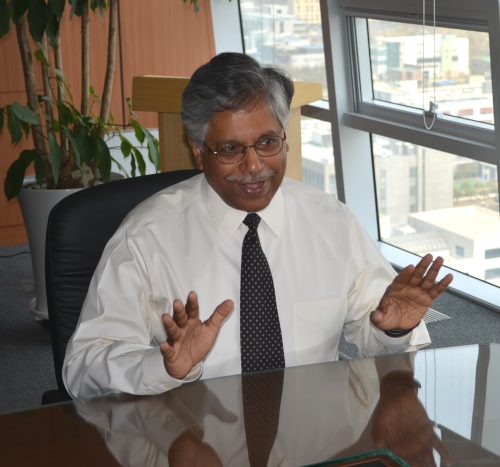Agency reaches out to SoftBank, POSCO for infrastructure in Mongolia
SONGDO, Incheon ― Two years have passed since the United Nations Economic and Social Commission for Asia and the Pacific, Northeast Asia subregional office was established in Songdo.
After making connections and contacts with regional think tanks, academics and the private sector, the real challenge is still ahead for Dr. Kilaparti Ramakrishna, the head of the UNESCAP for East and Northeast Asia, which aims to promote unity and growth through economic and social programs.
As he starts his second term from next month, his priority is to boost the “feeling of community sentiment” in Northeast Asia, said Ramakrishna, or “Rama,” as he prefers to be called.
Although there are only six members, one of the smallest in the U.N. subregions, they account for one-quarter of global GDP and trade whose influence on the world, Rama said, is “truly extraordinary.” UNESCAP for East and Northeast Asia members are China, Japan, Mongolia, South and North Korea, and Russia.
But they still fall short of connectivity or cultural affinity, compared with Southeast Asia or Europe, due to historical differences and conflicts.
 |
Dr. Kilaparti Ramakrishna (UNESCAP) |
“Our challenge is connecting this subregion,” Rama told The Korea Herald.
“We are the single most comprehensive, multilateral mechanism in the subregion, and we are trying to use that to bring the countries together, and tackle problems and issues.”
As a start, the U.N. agency seeks to help Mongolia increase its trade with other Asian countries, and support its development of infrastructure to make the country become a bigger part of Asia by coordinating closely with the private sector, including Japan’s SoftBank, South Korea’s POSCO and the Korea Business Council for Sustainable Development.
It is looking to help build a wind power plant in Mongolia, with energy generation equivalent to about 200 nuclear power plants, and water facilitation projects.
Mongolia is the least developed among the agency’s members, besides North Korea, but it considers the mining-focused country “the new Middle East.”
“If part of that dream is realized, Mongolia is going to be connected (to the world),” Rama said.
He emphasized that the only way to develop such massive-scale projects is through partnerships with the private sector as the U.N. cannot do everything on its own.
South Korea, which has human resources and global construction players, is in a favorable position to help countries like Mongolia with its own development model.
“In one life-span, (South) Korea’s per capita income, which used to be lower than sub-Saharan Africa’s become higher than the average for Europe. That is extraordinary,” he continued.
As South Korea did this and built its economy with support from international organizations such as the U.N. and the World Bank, the country is more than capable of, in the words of U.N. Secretary-General Ban Ki-moon, “giving back” and “sharing” its knowledge.
“Korea can be the window to the rest of the world for agencies or institutions not only in this subregion, but other regions like Africa. We are ready to make it happen,” Rama said.
But when South Korea and the world bring attention to developing countries such as Mongolia, Rama said he wants to make sure that infrastructure development will create jobs, especially for the young.
North Korea’s economic and social development is another “huge challenge” facing UNESCAP, but Rama said the agency will need to wait until all political issues are resolved before further making pragmatic engagement.
“We must get the politics sorted out first and foremost. You can’t call (North Korea) on one hand a pariah nation and at the same time expect it to be a fully responsible member of the international community. They cannot co-exist.”
However, he said that the UNESCAP is ready to “multiply the magnitude of efforts” it can do for Mongolia as the agency can do for North Korea.
By Park Hyong-ki (
hkp@heraldcorp.com)





![[Exclusive] Hyundai Mobis eyes closer ties with BYD](http://res.heraldm.com/phpwas/restmb_idxmake.php?idx=644&simg=/content/image/2024/11/25/20241125050044_0.jpg)
![[Herald Review] 'Gangnam B-Side' combines social realism with masterful suspense, performance](http://res.heraldm.com/phpwas/restmb_idxmake.php?idx=644&simg=/content/image/2024/11/25/20241125050072_0.jpg)

